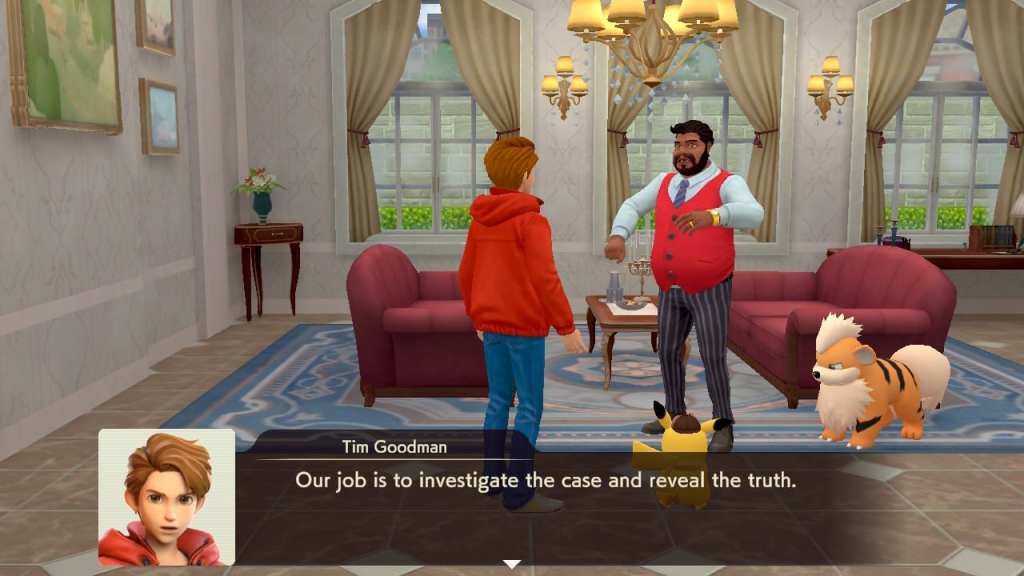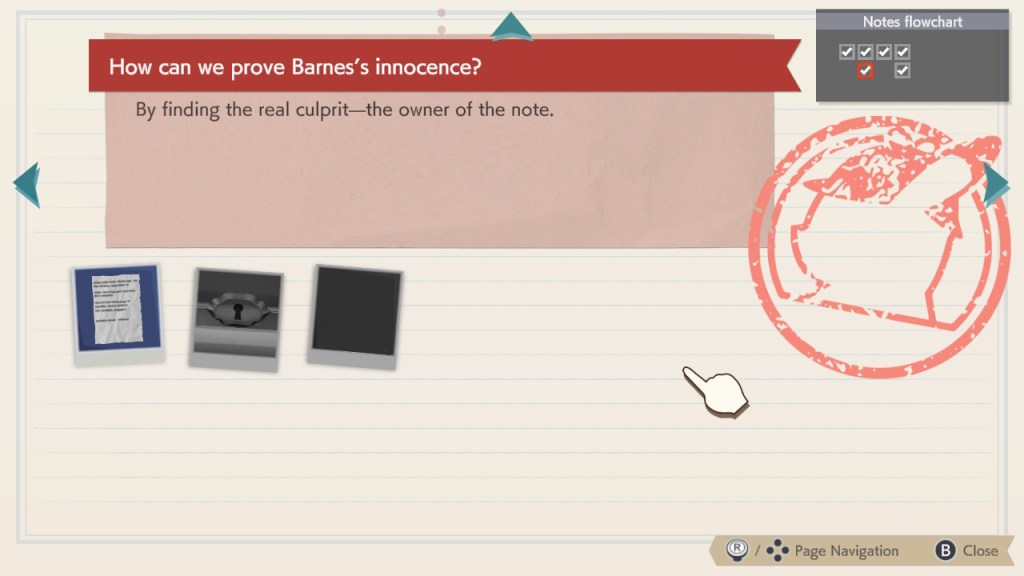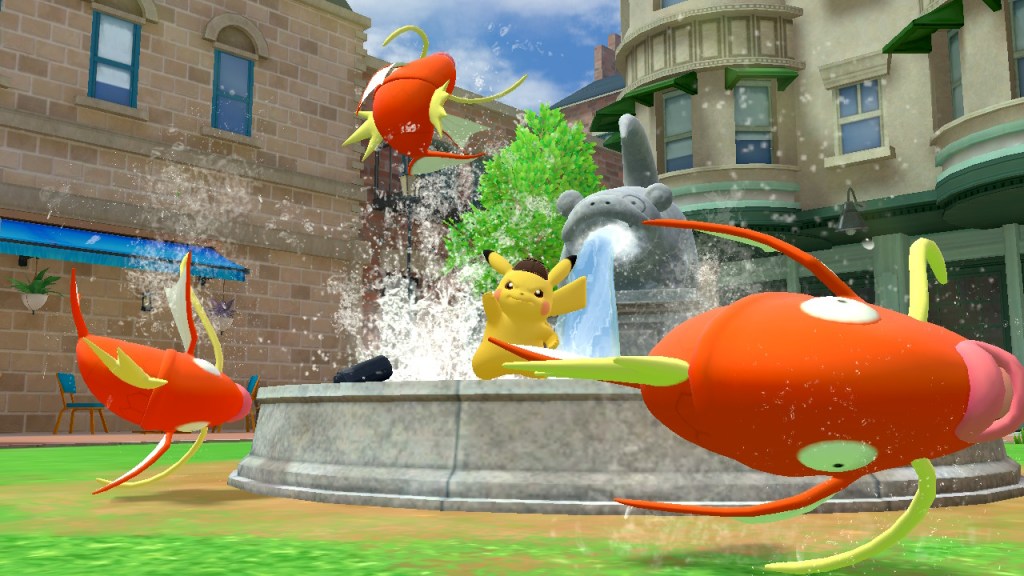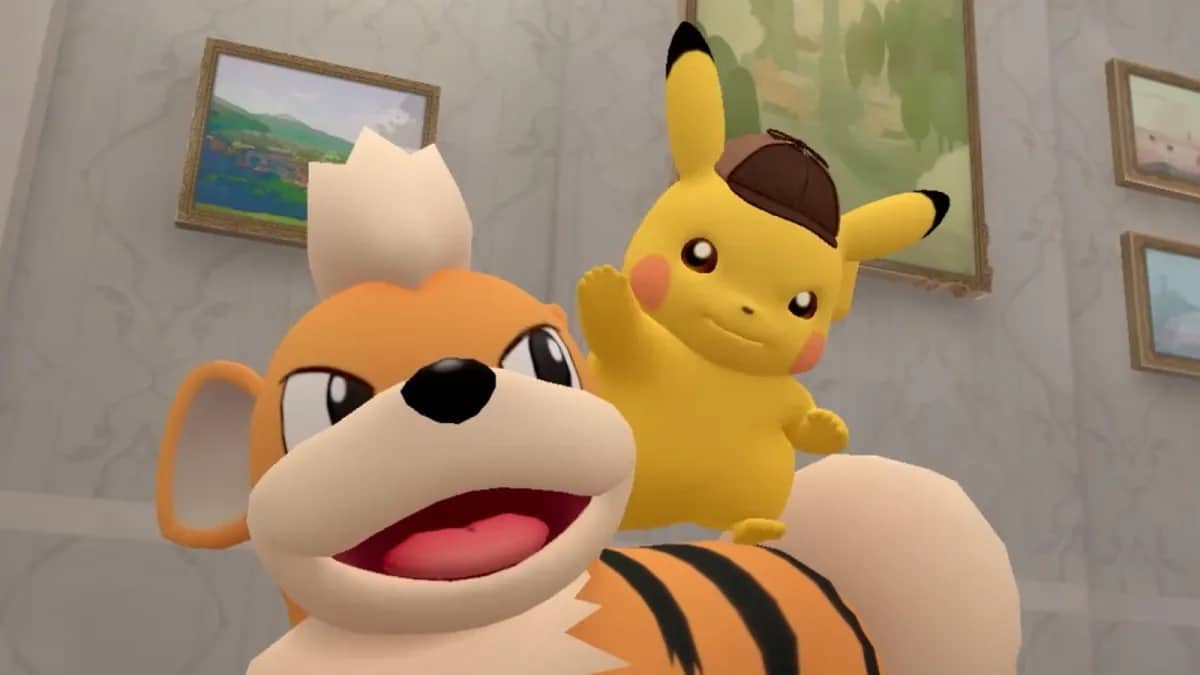Ryme City is strange. Deeply strange. In a way that Pokemon games rarely acknowledge. Where the base titles in the long-running series largely focus on the fun and carefree nature of travelling the world as a talented Pokemon trainer, Detective Pikachu Returns is more concerned with what it really means to live in a world of Pokemon – one that isn’t so very different from our own.
It’s a world where folks with evil intentions prey on innocent creatures, and look to exploit them for their own gain. One where hideous capitalistic intent is buoyed by the magical nature of Pokemon and their varied abilities. Detective Pikachu Returns, much like its 2016 predecessor and its companion film, is dark. Surprisingly dark.

In this adventure, Detective Pikachu and his companion Tim Goodman are once again tasked with taking down evildoers as an array of crimes pop up around Ryme City. And once again, they’re also looking to solve an overarching, central mystery: what happened to Tim’s father, Harry Goodman.
After years, answers wait on the horizon – with plenty of sudden twists and strange turns along the way. Detective Pikachu Returns displays a strong commitment to defying expectations throughout its narrative, which charts topics previously untouched in Pokemon history.
Read: Pokemon Scarlet and Violet: The Teal Mask DLC Review
What does police corruption look like in a world of magical creatures? How does global warming impact the habitat of Pokemon? Is it ethical to disrupt the free will of conscious creatures? These are topics that Detective Pikachu Returns doesn’t shy away from – and while their explorations are couched in all-ages-friendly dialogue, there is far more that adult players will take away here.
There’s a sinister throughline weaved into each case in this game, with investigations touching on heavier themes: greed, exploitation, and experimentation. It’s made all the more compelling by the aesthetic of the game, which frequently boasts eye-popping colours and absolute cuteness in the form of Detective Pikachu and his Pokemon companions.
Pikachu will pull a cute face, drink coffee and leave an adorable froth moustache on his mouth, and then he’ll launch into a sharp diatribe about the treatment of Pokemon, and the shame of manipulating Pokemon for monetary gain. The juxtaposition is wild, and impactful, and it contributes to a unique Pokemon story that feels bold and altogether different.
It’s also the game’s tight design that contributes to that sense. Where traditional Pokemon games are freeform, Detective Pikachu Returns is surprisingly cloistered. It takes place in smaller biomes, with the action largely couched in the tropes of the visual novel genre. It’s a fair bit more open than your standard visual novel, but the storytelling takes a similar form.
As Tim and Pikachu, you are compelled by a variety of unique individual cases, and then must explore environments to gather clues, interview witnesses and suspects, and draw conclusions based on your findings. This is a linear process, in that you’ll need to gather the exact clues and a firm solution before drawing your case to a close – but Detective Pikachu Returns balances this rigidity with reasonably rigorous dilemmas.

Some cases require more thought than others – and there are some where the solution is immediately obvious, and going through the motions of picking up clues becomes a frustration – but generally, there is fair thought required to puzzle through each step of a case.
In a typical scenarios you’re provided with three potential solutions, all of which must be assessed to move forward. You’ll make a choice, based on your findings and Pokemon knowledge gathered, and then you’ll get a right or wrong determination. There are seemingly few consequences for getting a case wrong, but there is certainly satisfaction in piecing each clue together, as they resolve into a linear form.
The opening case of Detective Pikachu Returns – the only one I can talk openly about within this review – is a great demonstration of strong pacing, and how to pull off a dramatic turn. The investigation begins with seemingly ample evidence – enough to make a Miss Marple or Poirot proud – before Tim and Pikachu begin poking at the holes in the case, making a gap wide enough for the culprit to fall through, with a clatter.
This case also allows the game to break out from its visual novel-style bounds, as Pikachu takes charge, and ventures with a Growlithe into the wider world to track scents, interrogate Pokemon, and eventually uncover the truth behind the plot in a final, choice-based showdown that requires you to put your assumptions to the test.
In later cases, this process is expanded further, with an array of real-time puzzles to solve, Pokemon trivia to answer, and individual character requests requiring you to go off the beaten path and aid your fellow citizens of Ryme City.

While overtly silly and over-the-top at times, Detective Pikachu Returns effectively balances its light with its extreme darks, wielding its cuteness as a tool to tell an impactful and fairly relevant tale about corruption, felt throughout various cases.
It threatens to venture into too-heavy territory on occasion, but the bright sparks generated by Pikachu and Tim help to keep the action thrumming as each case resolves, and the light at the end of the tunnel gets brighter.
As a linear story, it doesn’t leave a lot of room to venture beyond the bounds of each cloistered case, and as mentioned, puzzles are occasionally a bit too obvious. But as a deeper exploration of the world of Pokemon, and one unafraid to be a bit strange, it’s a unique and punchy game packed with neat revelations.
Pokemon has rarely been this ominous, but with Tim and Pikachu as its leading lights, Detective Pikachu Returns reveals itself as a solid puzzle adventure with plenty to say about the real world.
Four stars: ★★★★
Detective Pikachu Returns
Platforms:
Developer: Creatures
Publisher: The Pokemon Company
Release Date: 6 October 2023
A copy of Detective Pikachu Returns was provided and played for the purposes of this review. GamesHub reviews are scored on a 5-point rating scale.

![Detective Pikachu Returns Standard - Nintendo Switch [Digital Code]](https://m.media-amazon.com/images/I/51mftpx7IJL._SL500_.jpg)




